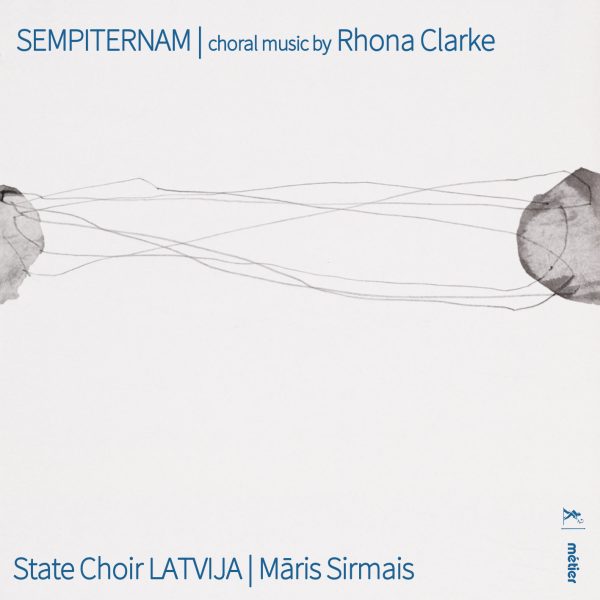Fanfare
Continuing on from its discs of Rhona Clarke’s chamber music (Fanfare 40:6 and 40:1), and the vocal disc I am wind on sea (Fanfare 40:4), Divine Art presents a whole disc of Clarke’s music for choir.
Written in 2020, O vis aeternitatis offers a brilliant example of the power of Clarke’s writing. Taking a responsory text by Hildegard of Bingen that meditates on the power of eternity, Clarke’s wide-ranging writing (gleaming dissonance, vocal glissando, glowing harmonies) itself seems to invoke eternity, even within this limited time-scale (not quite six minutes). All credit is due to the Latvian choir for negotiating Clarke’s writing, particularly the sopranos, who spend a lot of time in their highest register.
There is a decidedly celebratory aspect to Clarke’s “Regina caeli,” the first of the Two Marian Anthems of 2007. Only at “hora pro nobis” does the music move to more internal regions before a crescendo on “alleluia” brings the music back to its starting point. The second of the Two Marian Anthems is inspired by the central movement of Bartók’s Fourth String Quartet, both in the harmonic material and in the lines. This is slow throughout, the harmonies surely being difficult to gauge for a choir; the State Choir LATVIJA sings beautifully.
Beginning with an almighty crash, Ave atque vale (given as 2017 in the track listing and 2018 in the booklet) is a remarkable setting of Catullus’s poem, an expression of deepest grief on the death of his brother. As a piece that questions violence, with its downward vocal slides, it could hardly be more timely. This is very different from the ravishing Make We Merry: Three Carols on Medieval Texts of 2014, an ingenious melding of the warmth of carols that yet retains hints of Clarke’s characteristically pungent harmonies. The second, “Lullay, my Liking,” is particularly beautiful, while “Make we Merry,” the final carol, is sprightly and vibrant. It is also the lyric that the piece as a whole takes its name from. I mention this because once more there is dissonance between track listing (which gives Three Carols on Medieval Texts as the title) and booklet note, which gives the more correct, fuller version of the title.
The 2020 Requiem is markedly compact, in four movements (“Introit,” “Lux aeterna,” “Pie Jesu,” and “In Paradisum”). The date is significant, as composition was begun at the time of the first UK Covid restrictions, although the composer claims the text is one she had long wanted to set and had nothing to do with the pandemic. Using repetition to invoke a ritualistic atmosphere, the “Introit” seeks to enter other worlds, with gleaming soprano dissonances and a forceful pleading on “exaudi.” Nothing can prepare one for the textures of the “Lux aeterna” though—shifting, shining, dominated by the interval of a second. The text of “Pie Jesu” traditionally invites with a gentle setting, and so it is here, the music softly rocking. It is a measure of the fine recording that we can hear detail as well as texture, just as we can hear the background against the fine soprano soloists in “In Paradisium.”
The disc concludes with four pieces. The first a setting of Ulick O’Connor, The Kiss (2008), a kind of melding between octatonicism and madrigalist question-and-answer passages, while the bright sunlight of A Song for St Cecilia’s Day (1991) is the perfect reflection of Dryden’s text. The choral brightenings at harmonic arrival points are brilliantly effected by the Latvian choir.
It’s fascinating to hear a setting of Mary Elizabeth Frye’s über-poignant poem “Do Not Stand at My Grave And Weep” (2006); there is hope in Clarke’s setting even from the first line. Massively poignant, this is a clear highlight of this fine disc. It’s likewise interesting how The Old Woman (2016) takes a nursery text and underlines the darker elements, partly but not wholly through stomping and clapping. She also incorporates a quote from Elizabeth Maconchy’s Prayer Before Birth: The line “I am not yet dead” quotes the melody of Maconchy’s setting of “I am not yet born.” Finally, there comes the 1994 Rorate Caeli, cast in Hypolydian mode initially, then Aeolian. The music is curiously timeless, floating and beautiful. This piece is also demanding of its choir, and once more the Latvian forces triumph.
This is a lovely disc. Rhona Clarke’s music is certainly worthy of attention, and it is wonderful to hear it in performances of this calibre. There is many an American choir that could benefit from acquaintance with her output.
@divineartrecordingsgroup
A First Inversion Company
Registered Office:
176-178 Pontefract Road, Cudworth, Barnsley S72 8BE
+44 1226 596703
Fort Worth, TX 76110
+1.682.233.4978












